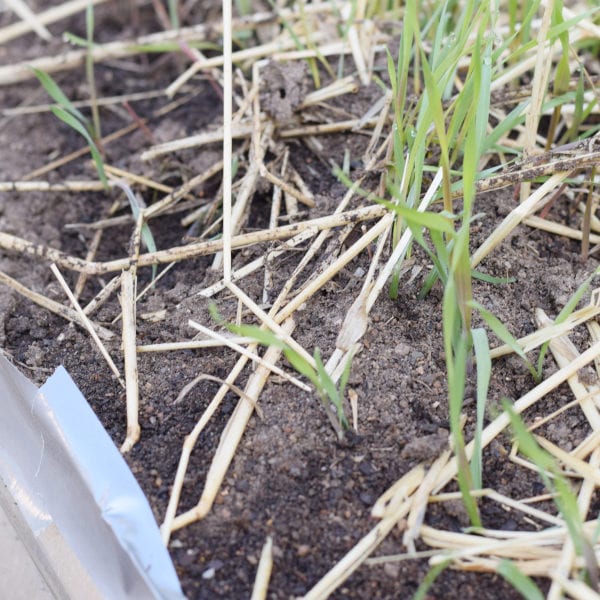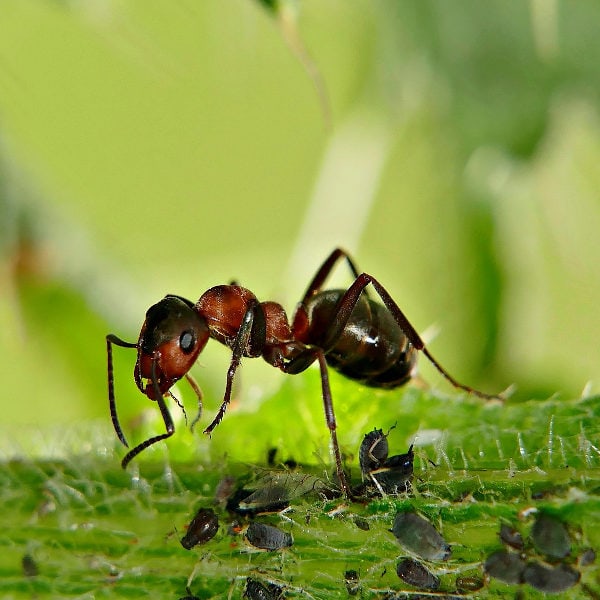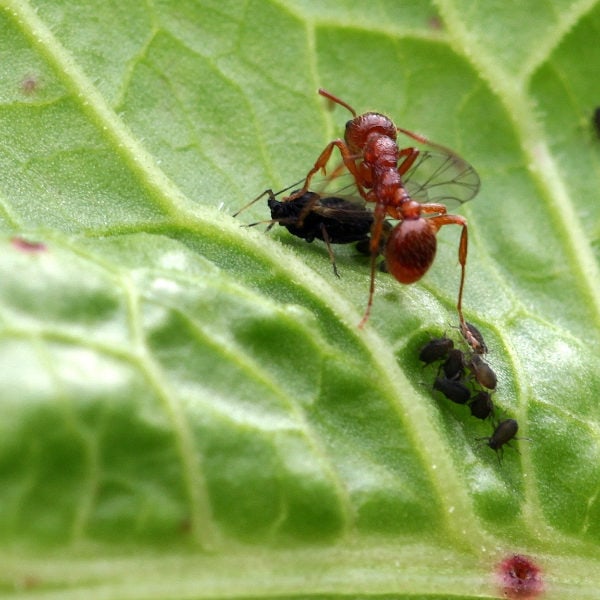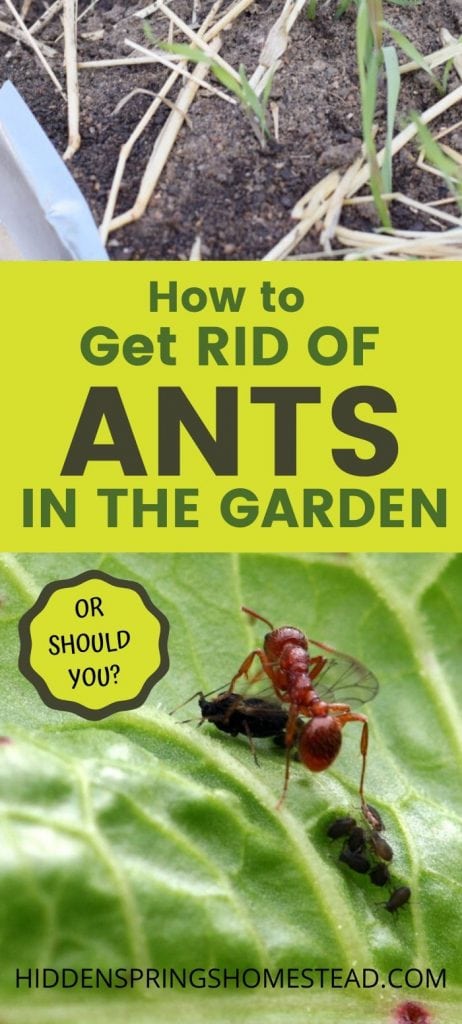How To Get Rid Of Ants Out Of Your Veggie Garden
Hidden Springs Homestead may earn a commission for purchases made after clicking links on this page. Learn More.
Ants in the garden – good or bad? Friend or foe? How do you get rid of ants in the garden? There is a lot of mixed discussions about this.
Ants can be beneficial to the garden, but they have their disadvantages too. Decide if you need to get rid of them.
This year when was killing cover crops in the raised beds, to get ready for spring gardening, I discovered rather large ant hills in them.
After a closer look, fortunately they are only a simple native garden ant (Lasius niger). I'm so glad they are not the notorious "fire ant" that is not native and extremely hard to deal with.

But these little guys still pack a punch when they bite to defend themselves. And since they are in organic raised beds, it makes it rather difficult to get rid of them.
So how can you get rid of them naturally? I did some research and this is what I found out.
About Garden Ants
There a two main types of garden ants, the red ant (Myrmica rubra) and a tiny black ant (Lasius niger) Both these are common garden ants or lawn ants.
The queen ant over-winters and emerges in the spring. She will fly from neighboring gardens searching for a place to build a nest and lay her eggs.
Her body significantly longer and fatter than the worker ants. She will lay her eggs and feed the brood for three to four weeks before pupating in the soil.
All adult workers are female. They will emerge from the nest after a couple weeks to maintain the nest and feed the queen and other larvae.
The workers go out to find food and when they find it, they leave a trail of chemicals called pheromones back to the nest for other ants to follow.
The larvae are white legless grubs that are roughly 5mm long. Each colony of ants can vary in size from a mere 500 to many thousands. They multiply rapidly and if not careful, your garden can become overrun with ants.
Between August and September mating will take place during flight, after mating the male dies and the female will return to the soil to over-winter to awake and begin a new cycle the next spring.
FAQs
Do ants cause damage in the garden? Are they bad for the garden? How do I get rid of ants naturally?
There was huge list of questions, so I've compiled a this information and you decide if ants are good for your garden or not.
7 Benefits of Ants in the Garden
Of course, it really depends on who you are talking to as to whether ants are beneficial to the garden. Here some benefits for ants in the garden.
- They are similar to earth worms by helping aerate the soil. They dig lots of tunnels that helps to carry water, oxygen and nutrients to plant roots.
- Ants are also good pollinators. They carry pollen from bloom to bloom looking for sweet nectar.
- They help to naturally control garden pests by eating their young or interrupting their feeding cycle.
- Ants kill off caterpillars by attacking them in large numbers.
- Ants don't strip vegetation leaves unlike many other garden insects. No harm to vegetables are caused by ants.
- They are also good indicators of an aphid problem. Since aphids secretes sweet sugar ants will naturally be attracted to them. You can easily "spot" ants in the garden when aphids are tiny and sometimes hard to spot.
- Ants also help to speed decomposition of organic matter such as leaves, straw and even other dead insects. This helps to fertilize plants.
Disadvantages
- They are attracted to aphids. (two-fold) Since they are attracted to the sweet secretions of aphids, ants tend to protect them. So they will protect the aphids and allow them to multiply quickly.
- Ants will help to increase other garden pests populations such as the whitefly, scale and the mealybug. All of these produce sweet secretions making them friends to the common garden ant.
- Ants, themselves multiply in number rapidly!
How to Get Rid of Ants In The Garden
When you google how to get rid of ants in the garden, you'll find all kinds of suggestions. Since this is my first time ever dealing with this, I'm in the market to try various ways to see what happens.
Here is some suggestions I've found:
Organic No-Chemical Methods to Rid Ants
- Observe ants when you find them out foraging and follow them back to the nest. When you find where they are going, if not obvious, dig up the soil as deep as possible to make sure to remove the queen.
- Introduce beneficial nematodes – these are tiny "worms" enter the body of the ants and excrete bacteria into the digestive track killing the ants in 24-48 hours.
- Encourage insectivorous birds by hanging bird houses and feeders near the garden.
- Early in the morning, place a metal can over the hill. As it heats up in the sun, the ants will carry their eggs to the surface and up in the can. Later in the evening, slide a cardboard or solid surface under the can to capture the eggs. Dispose of them by feeding them to the chickens or killing them.

Natural Ways to Get Rid of Ants
These are really simple homemade non-toxic ways.
Combat Ants with Aspartame
Brand name of aspartame – Equal and NutraSweet. The little blue and pink packets found on the table in many restaurants. Sprinkle this around around on the hill.
It's toxic to ants and causes their senses to malfunction. It over stimulates their brain cells and will cause them to die.
Orange Guard
You can actually purchase an orange peel spray or make your own DIY Citrus Spray. Citrus peels contain a natural extract, d-Limonene, which is not harmful to the environment or the soil. This is a food grade product, so safe for vegetable gardens.
This immediately strips away the waxed coating on ants causing them to suffocate.
Diatomaceous Earth
This is a natural product made from crushed fossilized hard-shelled algae called diatom's. They are ground into a fine powder. The shells even in powder form have sharp edges that penetrates the body of the ant causing it to die from dehydration. This times takes about 2 weeks.
Diatomaceous Earth is not harmful to humans, plants or even pets. Be sure when you purchase to get the "food grade."
Cinnamon
Cinnamon is known to REPEL ants but not kill them. Remember, ants are attracted to sweet things and cinnamon is not on that list.
If you use it, make a thick line around the plant that is being bothered or sprinkle on the ant hill heavily. This deters the workers that are out from returning to the hive.
This works best for plants in containers, but it can still be used in raised beds gardens.
Dawn Dish Soap Spray
Mix dawn soap and water and put into a spray bottle. Spray liberally over affected plant. This idea works well with plants in containers too. But it will work in the garden too.
This not only kills the ant it also kills the pheromone trail.
NOTE: Use this spray on plants during low temperatures. Don't spray during hot sunny days. It will burn the plant leaves.
Borax – Will it Hurt Plants?
I'm going to leave this option totally up to you. I have found all kinds of references to using borax to get rid of ants in the garden. There are lots and lots of recipes available when googling.
Even though Borax is made from the natural boric compound it does have a low toxicity to both humans and pets. It seems to be a really popular product for getting rid of ants though.
Ants love sweet things, so mix borax with a one-to-one white sugar to camouflage the flavor. Sprinkle on ant hills and they eat it as well as carry it back to the nest for the others. This is highly toxic to ants and can wipe out an whole colony in just 2-3 days.

I'm not sure if I will try this one. Our raised bed gardens are totally organic and I've worked really hard and made many sacrifices to keep it this way.
So now you have to decide. Are ants in the garden friend or foe? Should they stay or should they go?
As I said, I'm glad they are not the fire ants that are so destructive and super hard to get rid of.
I've only planted onions, lettuce and broccoli so far this year and been bitten on more than one occasion. So I'll be pursing getting rid of them in my garden beds.
I'll let you know what all I try and how well it works. Stay tuned…….
More Garden Tips
- How to Control Tomato Horn Worms
- 5 Ways to Naturally Control Cabbage Worms
- How to Get Rid of Squash Vine Borers


Dianne Hadorn is the owner of Hidden Springs Homestead nestled in the hills of East Tennessee. She is a Master Gardener and enjoys helping others learn how to grow and preserve their own food and sharing tips for living a more self-sufficient lifestyle.
How To Get Rid Of Ants Out Of Your Veggie Garden
Source: https://www.hiddenspringshomestead.com/get-rid-of-ants-in-garden/
Posted by: millardfornow38.blogspot.com

0 Response to "How To Get Rid Of Ants Out Of Your Veggie Garden"
Post a Comment